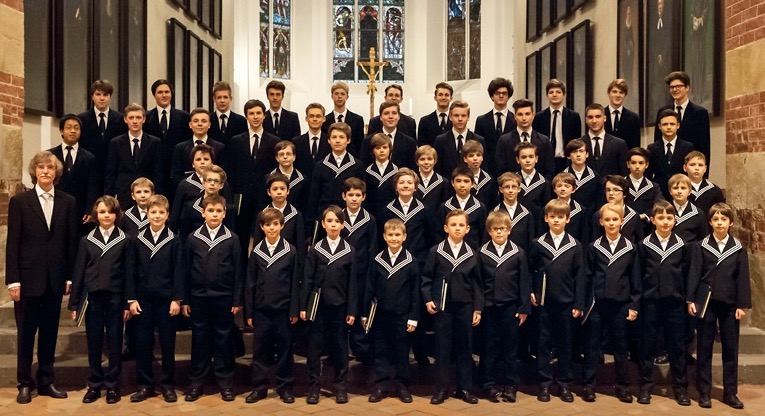
By now, you’ve probably heard that our Gala Concert is sold out, something about which we’re very excited! Hosting this very esteemed choir is a special delight: earlier iterations of this group sang the first performances of much of the music we revere, with a performing tradition that dates 805 years! For 27 years, our beloved J.S. Bach led the Thomanerchor, and his time in Leipzig was one of the most fertile and profound periods of his compositional output, spanning the Passions as well as the Mass in B-Minor. There is a special consonance in hosting them at Central Moravian Church, which is where Bach’s music was first heard in the United States, and where his epic Christmas Oratorio and the Mass were heard for the first time in America, sung by The Bach Choir!
Required reading for those excited to attend the concert is this excellent preview by our friend Steve Siegel in the Morning Call (it’s so well-reported and written that I have little to add!). I think listeners will be astonished by what’s achievable by the young voices of the Thomanerchor. Steve touches on the differences between the quintessential men and boys sound of the English colleges and cathedrals and the more visceral Continental sound of groups like the Tomanerchor (those differences aren’t quite as stark these days – many English practitioners have been adopting the Continental sound – less breathy, sometimes even a smidge of vibrato – for some time). Even so, you won’t mistake the boys’ voices for those of the adult women who sing the soprano parts in most of the professional choirs performing and recording Bach’s music at high levels these days. There’s an astonishing earthiness that’s hard to replicate in the the boys’ singing: color for miles, ease with the high tessituras, and the sparkle of enthusiasm of young people stretched to the edges of their talent. Saturday’s concert will be a real treat.
The program includes the music of Schütz and Schein (the latter, one of Bach’s predecessors at the St. Thomas Church), as well as three of Bach’s best motets (it’s hard to pick a favorite). I have a recording of the choir singing one of the motets they’re offering on Saturday’s program, the rhapsodic Der Geist Hilft, which they sing with alarming accuracy and seeming ease. There’s a linear quality to their singing that, when offered in their vibrant voices, is especially thrilling. One feature of continental boys choirs is the use of boy altos, as opposed to the adult countertenors used in English choirs. You’ll be able to hear some wonderfully earthy chest voice singing, colorful and full of core.
It wasn’t until I got to college that I realized the musical potential of young voices. I spent a year singing at an Episcopal church with a fantastic men, boys, and girls choir, with an especially ebullient English conductor. At my first rehearsal, we sight-read a lot of challenging works, and I struggled to keep up, even as a sophomore music major. The boys and girls, however, sailed right through the repertoire. As part of a little audition after that first rehearsal, I sight-read a challenging piece, and the music director turned to me after and quipped, “You can almost read music!” (He was known for his creative, if slightly backhanded compliments – he once told the basses of the choir that they sounded as though they were standing in water…) He was right, though. Watching the kids plow through the music with considerably less difficulty than I was having was humbling, sure, but also deeply illuminating. When a parental support structure is firmly in place, sufficient time is given to regular rehearsal and instruction, and an inspired leader is at the helm, there’s very little that young singers can’t accomplish. After about a month of my immersion in the challenging repertoire and swiftly-paced rehearsals, I had advanced to a level of comfort with sight-reading that dwarfed my gains after an entire year of studying sight-singing in college. My school’s proximity to The American Boychoir and two inspired church programs for young singers cemented in my mind what’s possible.
We’re lucky to live in an area with accomplished school choral programs, as illustrated at our Family Concert a couple years ago when we had a youth choir festival. Talented young singers in the region are also very lucky to have the opportunities afforded them by the Bel Canto Children’s Chorus of the Bach Choir of Bethlehem. The work that Joy Hirokawa and her colleagues do with the children is inspiring and deeply artistically satisfying. You’ll be able to enjoy their work in our upcoming Christmas Concerts, held in both Bethlehem and Allentown. I highly commend those concerts to you – plan now to attend. We’ll be singing a panoply of carols, including Ralph Vaughan Williams’ timeless Fantasia on Christmas Carols, as well as a concert version of A Child’s Christmas in Bethlehem, our very-successful recording for Analekta. You’ll hear children’s voices singing on their own, with us, and in the reading of poetry. Visit our season page for more information and to order your tickets (Bethlehem reliably sells out, with Allentown not far behind – you won’t want to miss it). This concert is especially appropriate for children of all ages. Bring the children/grandchildren/great-grandchildren/nieces/nephews, etc. Experiences make great gifts, treasured memories, and, who knows, possibly a spark of inspiration to study music more intensely by our young.
I will preview Saturday’s concert, Tuesday’s upcoming Bach at Noon, and more on this coming Friday morning, November 10th, at 10 am, on WDIY. Tune in for a little taste of the Thomanerchor, for a snippet of Cantata 69, which will be offered robustly at our 90th (!) Bach at Noon, and maybe an early carol!










































